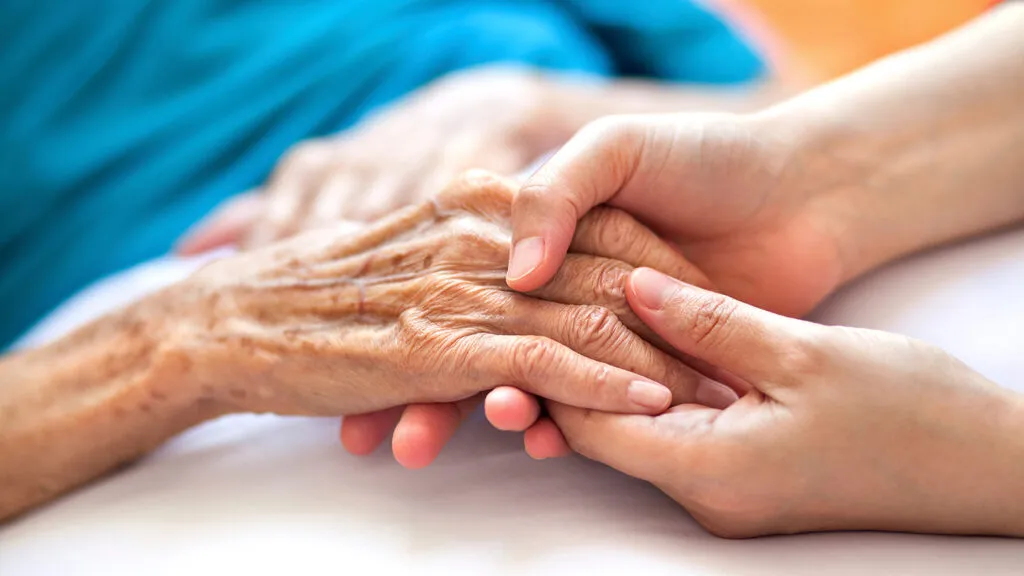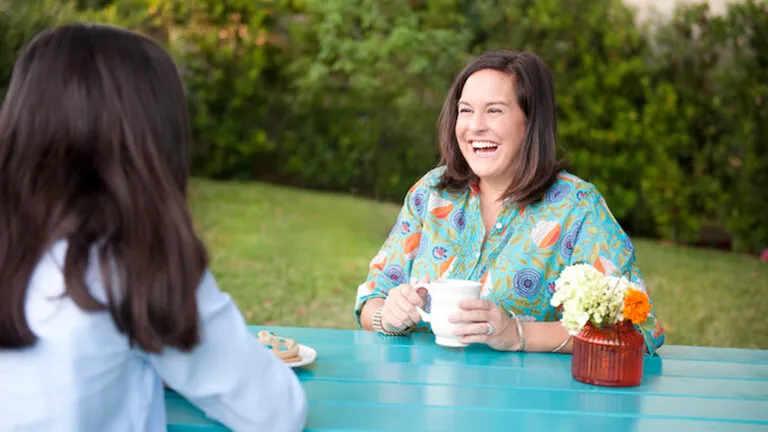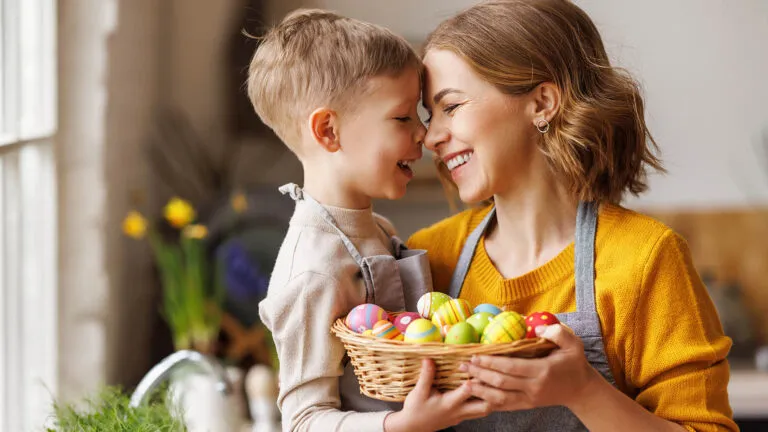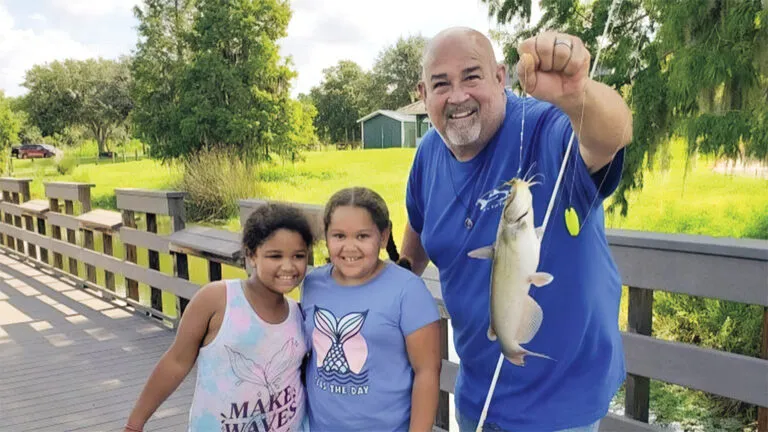I put up my new 1994 calendar in the kitchen, feeling like I’d finally gotten my life back on track. The past year since my divorce had been a long, hard struggle, but my three boys and I had adjusted to our single-mom household.
My job at a furniture factory kept food on the table and paid the bills. And I’d started going to church again with my mom. I couldn’t quite believe as she did that God had a deep, personal interest in our lives—I figured he had more important things to worry about than me—but I definitely found comfort in being closer to him.
One morning toward the end of January I saw the boys onto the school bus and was about to leave for my shift when the phone rang. “I’m from the Red Cross,” the caller said. “I got your name from a bone-marrow donor registry.”
Donor registry? Then I remembered. Two years earlier I’d seen a picture of a baby in the newspaper. Something in his big blue eyes called out to me, so I read the article. The baby needed a bone-marrow transplant, and the story pleaded for people to go to the Red Cross and take a simple blood test to see if their marrow could save the baby’s life.
Back then things had just about hit rock bottom for me. My marriage was falling apart, and I worried about what it was doing to the kids. I’d had to watch my dream of finding work where I could really see myself helping people, like physical therapy, get swallowed up by the grind of the factory job I’d taken to make ends meet. Well, maybe even a failure like me can help someone, I thought. So I’d gotten tested. Although I hadn’t been a match for the baby, I felt better having at least tried to do something for someone else. But with my husband and I going our separate ways, and all the stress of starting over on my own, I forgot about the donor list until the person from the Red Cross called that morning.
“There’s a chance that you’re a match for a 24-year-old woman with leukemia,” she said. “Could you come in for another blood test? If you’re still willing to become a donor, that is.”
“I’d like to try,” I replied slowly, that old longing to do something for someone else stirring in me. I’d been blessed with good health my whole life. Maybe this was my time to share it.
I turned out to be an almost perfect match for the woman with leukemia. “Only an identical twin,” a doctor informed me, “could be a better donor.” I looked over the booklet on bone-marrow transplants. Even though the picture of the equipment used in the procedure made me shudder—I didn’t know they made needles that long!—there wasn’t any question in my mind that I’d go through with it.
My kids were too young to understand what a bone marrow transplant involved, but my mom was afraid something might go wrong. “I’m putting your name on the prayer chain at church,” she insisted. I wasn’t real big on prayer, but I figured it couldn’t hurt.
On March 10 I went to the transplant center just across the state line in Minneapolis. I was so nervous that the doctors teased me about how badly my hands were shaking. But before I knew it the procedure was over, and the marrow extracted from my pelvic bones was on its way to that 24-year-old woman, who was waiting at another hospital somewhere in the United States.
Except for some soreness that went away pretty quick, I didn’t have any aftereffects from the procedure. I couldn’t stop thinking about it, though, wondering how the woman who’d received the marrow was doing. By law we weren’t allowed to know each other’s identities until a year after the transplant, so all I had to go by were the regular updates from the Red Cross. They said she was suffering complications: double vision, unexplained fevers, graft-versus-host disease.
It worried me enough that I asked Mom to add the woman to the prayer chain. In September the Red Cross told me that the recipient was home from the hospital. It looked like the transplant had worked!
Things in my own life took an upswing after that. Around Christmas I started dating Randy Bertrand, a friend of mine from the factory. I liked how he gave me a smile whenever he drove the forklift by my workstation, and stuck around to help me finish my work when my neck was aching one day. He was the kind of guy I could count on.
On the one-year anniversary of the transplant, the Red Cross sent me a letter with the recipient’s name and address: Rhonda Dietze, Medford, Wisconsin—only 75 miles away! Pretty soon we were trading letters, photos and phone calls.
“I don’t know what to say,” Rhonda confessed the first time we talked. ‘Thank you doesn’t seem like enough, considering what you’ve done for me.”
“Well, I have to admit, helping you made me feel better too,” I said. “I’m just glad everything worked out.”
“So am I.” Rhonda sounded like she looked in her pictures—gentle, unassuming, sweet-natured. I thought Randy and I were quiet, but she was even more shy than we were. Even though I really wanted to meet her in person, and see for myself that she was doing all right, I decided to wait until she brought it up.
In the meantime we got to know each other long-distance. It was uncanny how many things about Rhonda seemed familiar to me. Like me, she loved kids (she was a teacher), dogs, lilacs and being out in the country. Like my mom, she had a strong faith. “I believe God leads us where we need to be,” Rhonda told me. “We just have to trust him. When my doctors told me I only had a 20-percent chance of survival even with a bone marrow transplant and no one in my family was a good match, I didn’t give up. I kept praying. And God brought you to me.”
I didn’t know what to say. I hadn’t looked at things quite that way before.
Randy and I thought about inviting Rhonda to our wedding in August 1996, but since she didn’t mention getting together I held off, hoping she’d be ready to meet someday.
The following spring Rhonda sent me an invitation to her June wedding to her high-school sweetheart, Kevin Jensen. In May I got a phone call from Rhonda’s sister, Brenda. “I thought I’d surprise Rhonda and invite you to the shower I’m throwing her next Saturday,” Brenda said. “If you’d like to come, I mean.”
“Like to? I can’t wait!”
That Saturday, Brenda had me hide in the bedroom. When Rhonda arrived, Brenda led me to the living room and announced, “Here’s our other guest of honor.”
Rhonda gasped. “Elly?” she whispered, her eyes suddenly glistening. Before I could answer, she threw her arms around me and gave me a long hug.
Stepping back, she said to the other guests, “This is Elly Bertrand—the woman who saved my life.”
Everyone started clapping. “I’m just glad everything turned out okay,” I said, embarrassed they were making a big deal out of something that had taken such little effort on my part. Rhonda was the one who’d really been brave.
It wasn’t until a few weeks later, when I sat in a church practically blooming with lilacs and watched Rhonda walk down the aisle, looking absolutely radiant, that it hit me what a big deal the transplant really was. Rhonda now had a future to look forward to.
For the next year and a half Randy, the boys and I moved several times, looking for a place that felt right. We wanted to stay in Mondovi for the boys’ schools, and eventually we found a trailer home on a farm where I took over the care of the owner’s herd of dairy cattle. Milking 85 cows twice a day got my blood pumping (now that my sons were hitting their teens, I needed the energy), and the rhythm of the work was oddly comforting.
Things for Rhonda weren’t going so well. She tried to stay upbeat in her letters and phone calls, but I could hear a tiredness in her voice. It was Brenda who eventually told me that fall that Rhonda was having health problems because the radiation treatment she’d needed before the transplant had damaged her kidneys.
Then one day last February I found out how desperate her situation really was. I went to check our mailbox, and inside was a thick envelope with Rhonda’s handwriting. I opened it right away and started to read as I walked past the barns to our trailer.
“I have been praying for a way to go about telling you,” Rhonda wrote in her five-page letter. She explained that her kidneys were failing, and her doctor had said her best chance for long-term survival was a kidney transplant. “A bone marrow donor is like a twin since they have the same immune system. My body would recognize your kidney as its own…I feel bad presenting you with my situation when you have already done so much for me…But I felt that I had to at least give you the option to decide if this would be something you’d be willing to consider.”
I stopped dead in my tracks. Donating bone marrow was simple, I thought, but how am I going to make this decision? Rhonda had included the number of the transplant coordinator at the hospital where she’d gone for a consultation in case I needed it. I went inside and called.
“This transplant isn’t something you should rush into,” the coordinator warned me. “It means major surgery for you. And think about whether you want to go through the rest of your life with just one kidney. You could injure it in an accident, especially in your line of work.”
I tucked Rhonda’s letter in my jacket pocket and went to do the afternoon milking. As I tended to the cows, questions moved through my mind in almost the same rhythm, one after another. What would my boys do if something happened to me? What if one of them ever needed a kidney? Or if I injured my remaining kidney? But what if I was Rhonda’s only chance?
There was no way I could make this decision on my own. I knew where Mom and Rhonda would turn. God, I’m not used to this, I prayed, feeling a little unpracticed. But I’m trusting this decision to you. Please let me know what to do.
That night after the boys were in bed, I showed Randy the letter. “You know, my uncle donated a kidney to his brother 30 years ago, and both of them have been fine ever since,” he said. “Whatever you decide, I’m behind you a 100 percent.”
Mom said she’d pray that I would come to the right decision, but the rest of my family bristled at the fact that Rhonda had even asked. “It’s too risky,” they insisted. “It’s one thing to make a sacrifice like that for your own flesh and blood, but… “
The only time I could be alone to think was when I was doing the milking. For the next couple of weeks, every morning and afternoon, the long, narrow cowshed became my prayer chapel.
I read everything I could on kidney transplants… how an incision is made under the donor’s ribs to remove the kidney, how it leaves a sizable scar, how the surgery is harder on the donor than the recipient and might require six weeks of recovery time. I’d been so frightened by a picture of a bone marrow aspiration needle, yet nothing I learned this time fazed me. That’s when I knew. God, I’m so at peace with this whole kidney-transplant thing, it must be what you want me to do. I wasn’t scared at all.
The fifth anniversary of our bone marrow transplant was coming up, the perfect time for me to let Rhonda know. I sent her a vase of silk lilacs, the same color as the real ones at her wedding, along with a note: “I think I’ve made my decision, but my family’s against it. Pray for them to come around.”
When she got the gift, Rhonda called, crying so hard she could barely speak.
Once I passed the pre-transplant medical tests and psychological evaluation, I told the boys. They were really proud of me, and by the time the transplant date arrived, the rest of my family was behind me too.
It felt good going into the operating room on May 5 last year, knowing everyone I loved was supporting me. The surgery went well. Six hours later, a nurse had me up and walking. The next morning, I went down the hall to visit Rhonda.
She was sitting up in bed, a healthier glow on her face already. “Elly,” she said, taking my hand, “I am so thankful God made someone as giving as you.”
I knew how she felt. I was grateful to God too, for leading us, as Rhonda had told me, to where we needed to be. How else would an ordinary woman like me have ended up being a part of something so incredible?





